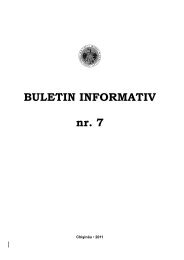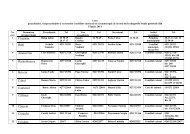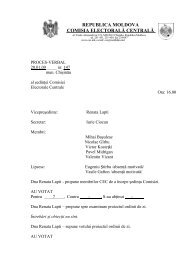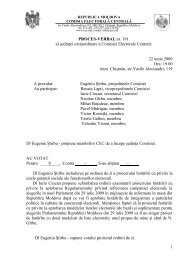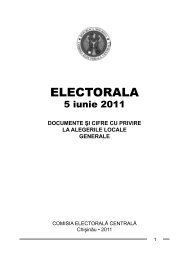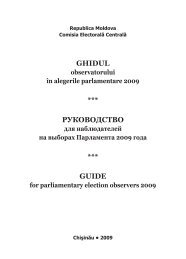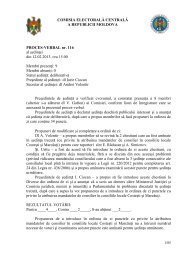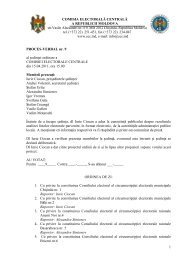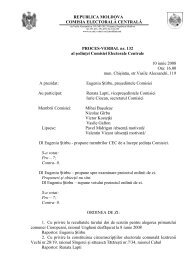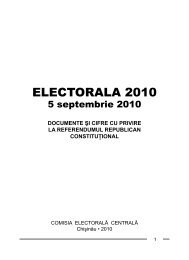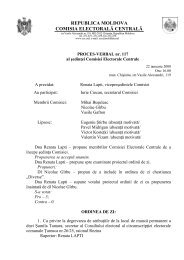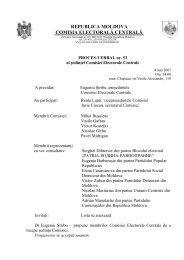noile tehnologii în formarea Åi utilizarea listelor electorale ... - Cec.md
noile tehnologii în formarea Åi utilizarea listelor electorale ... - Cec.md
noile tehnologii în formarea Åi utilizarea listelor electorale ... - Cec.md
- No tags were found...
Create successful ePaper yourself
Turn your PDF publications into a flip-book with our unique Google optimized e-Paper software.
Conferinţa internaţională.<br />
NOILE TEHNOLOGII ÎN FORMAREA ŞI UTILIZAREA LISTELOR ELECTORALE. EVOLUŢII ŞI PERSPECTIVE 87<br />
who turned out to vote on election day, thus ensuring the right to vote for broad<br />
categories of people abroad.<br />
The main problem, however, in the compilation of voter lists, is that most of<br />
our citizens abroad are not documented appropriately, and the exact number of<br />
eligible voters is not known. According to research conducted by the International<br />
Organization for Migration and National Bureau of Statistics, this number is<br />
estimated at least at 300,000 people, particularly persons between the ages of<br />
20-50 years. Considering that the total number of voters is ~ 2.4 million and ~ 1.6<br />
million participate in elections, these voters would be one quarter or one fifth of<br />
all active voters. As noted above, the voter lists include only those legally residing<br />
in the destination country. Although the exact number of Moldovan citizens living<br />
abroad is not known, Article 49, Paragraph (3) of the Election Code, provides that<br />
the Central Electoral Commission shall send the ballots to those precinct electoral<br />
bureaus set up outside the country not later than three days before election<br />
day, based on the number of voters registered on the updated voter lists, with a<br />
supplement of not more than 5 percent. The obligation to estimate the number<br />
of voters who will participate in elections and to request a sufficient number of<br />
ballots lies on the precinct electoral bureaus abroad. This, however, does not<br />
prevent the electoral administrators from permanent and usually unfounded<br />
criticism from different stakeholders in the electoral process. However, making<br />
them the only responsible for compiling accurate lists in this complicated situation<br />
is inadmissible, the more so when it is insisted, absolutely reasonably, on opening<br />
up more polling stations. In this respect the example and practice of Bulgaria is<br />
interesting, which took additional measures in the 2006 presidential elections to<br />
ensure that citizens from abroad could vote. The Bulgarian Government adopted<br />
the decision to open polling stations anywhere where at least 100 citizens of this<br />
state had claimed the right to vote in the localities in which they were staying<br />
abroad. To do that, Bulgarian citizens had to submit applications to be excluded<br />
from the voter lists in the country, and be included in special supplementary lists<br />
for the vote abroad. This avoids any accusations of manipulation, making it possible<br />
to know the exact number of ballots to be sent to the places in which the citizens<br />
will vote, allows clarifying the situation regarding persons who are included in the<br />
main lists, additional records of the citizens included in supplementary lists, and<br />
also makes those citizens responsible.<br />
A peculiarity of voting abroad and compiling voter lists procedure is that the lists<br />
indicate the series and number of ID document that allows citizens of Moldova to



